Disclosure: Meeple Mountain received a free copy of this product in exchange for an honest, unbiased review. This review is not intended to be an endorsement.
The year is 2013. It’s October or November, skirting the edge of winter in Connecticut. The time is approximately 11:24 pm. I’ve just come back from a game night at my friend Namita’s apartment, where I played Pandemic for the first time. I’m sitting in my garden apartment, perched on the bamboo-and-denim sofa I found a few months earlier at a local thrift store. I hold a Playstation 3 controller in my hands, having decided to knock out one level of Shadow of the Colossus before bed. There is a three-quarters eaten bowl of Annie’s White Cheddar on the table in front of me. It won’t be there for long.
A knock at the door.
Unexpected. I don’t know many people in the area, and I certainly don’t know anyone who would be out and about at this hour. Save for the glow of the TV, all of my lights are off. The blinds are drawn. I briefly consider pretending I am asleep.
Another knock.
I get up slowly and raise a single slat to peek outside, where I see two severe-looking individuals in suits.
A third and final knock.
Worried about a noise complaint, I open the apartment door.
“Andrew Lynch,” one of them says, more a statement than a question.
“Yes?”
“We need you to come with us.”
“Pardon?”
“We need you to come with us.”
“Right. Uh. Probably not? Who is ‘us’?”
“Your expertise is needed regarding a very specific cross-pollination of cultural properties.”
I blink.
“Just to confirm we have the right date,” the taller of the two says while reaching into her pocket, “you did play Pandemic this evening, at the apartment of Namita Ganatra?”
“Yes.”
“And you are currently working through the remaster of Shadow of the Colossus?”
“…yes?”
They turn slightly, likely locking eyes through their glasses. There is an almost imperceptible nod.
“Bag him.”
“Bag him,” I cry, “What do you mean, ‘ba—”
I am sedated and thrown into the back of a car.
Wild
Leviathan Wilds is the marriage of two great ideas. It combines the cooperative fire-dousing of Matt Leacock’s Pandemic with the monster-scaling vertiginous fun of Fumito Ueda’s Shadow of the Colossus. That’s a damn good pitch. Not since James Cameron sold Aliens to the studio by writing “ALIEN$” on the back of a script has a pitch been so perfect. Designer Justin Kemppainen is running with the old chestnut about the best artists stealing, and we the players are reaping the benefits.
For how little of it is described, the world of Leviathan Wilds feels wonderfully present. The gear worn by each of the Climbers, your avatars on the board, suggests a post-apocalyptic world more in touch with nature but also filled with novel technologies. “In touch with” is generous, perhaps. Those giant Leviathans destroyed most of the civilization that existed before. Humans haven’t Gone Back to the Land so much as they’ve realized buildings tend to get smashed.
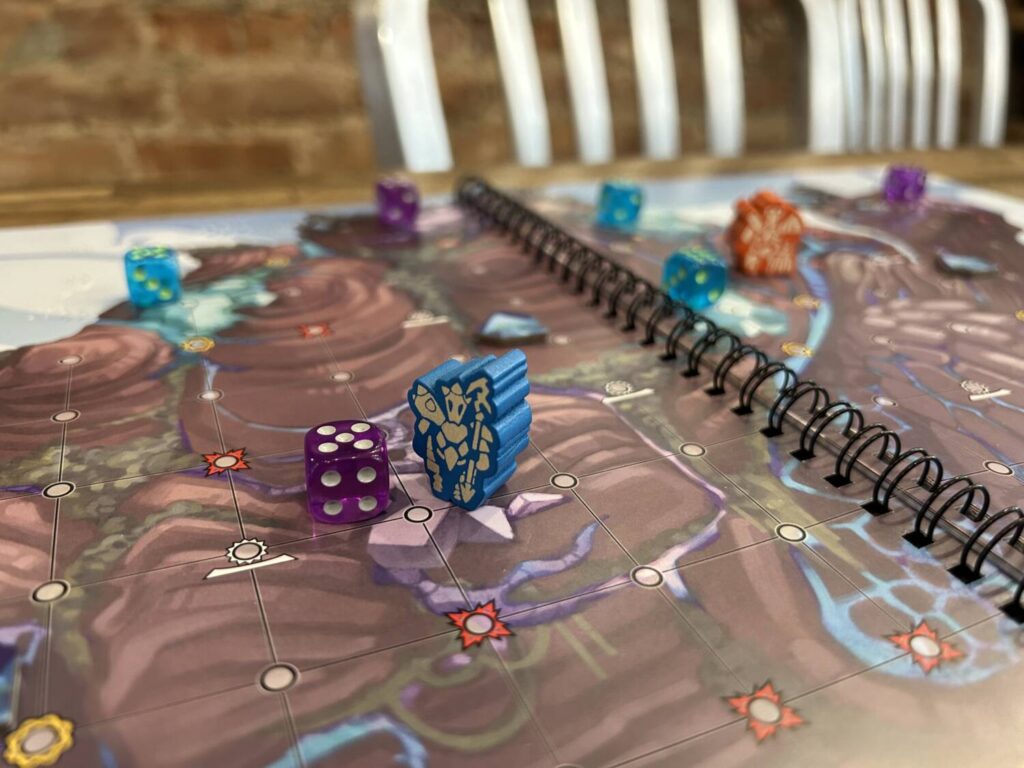
There is no board in Leviathan Wilds. Instead, there’s a spiral-bound book containing illustrations of the Leviathans, each taking up a two-page spread. The illustrations, gonzo science-fiction and fantasy that does a fine job straddling the difficult line between visually engaging and readable as a playing surface, are covered in grids that show where your characters can and can’t climb.
Climbing is how you spend much of your time. As in Shadow of the Colossus, you grip onto the sides of these massive creatures and haul yourself up, one fistful of fur at a time. Colossus kept climbing interesting by making you bad at it—you’re playing as some kid with a sword, a horse, and a dream—and by adding an endurance bar. In Leviathan Wilds, you are inarguably better climbers—you are, in fact, Climbers—but you still have to make sure you stop to rest every now and then. If you burn through your personal deck, referred to in the rules as Grip, you fall. It is entirely possible that you fall all the way to the bottom.
In the meantime, you’re ducking and diving and jumping and climbing to reach and destroy crystals, the visible evidence of a fungus that has infected the bodies of these Leviathans. For centuries, mankind thought the Leviathans were inherently violent and nasty, but it turns out they’re merely septic. If you manage to destroy the crystals, you free them.
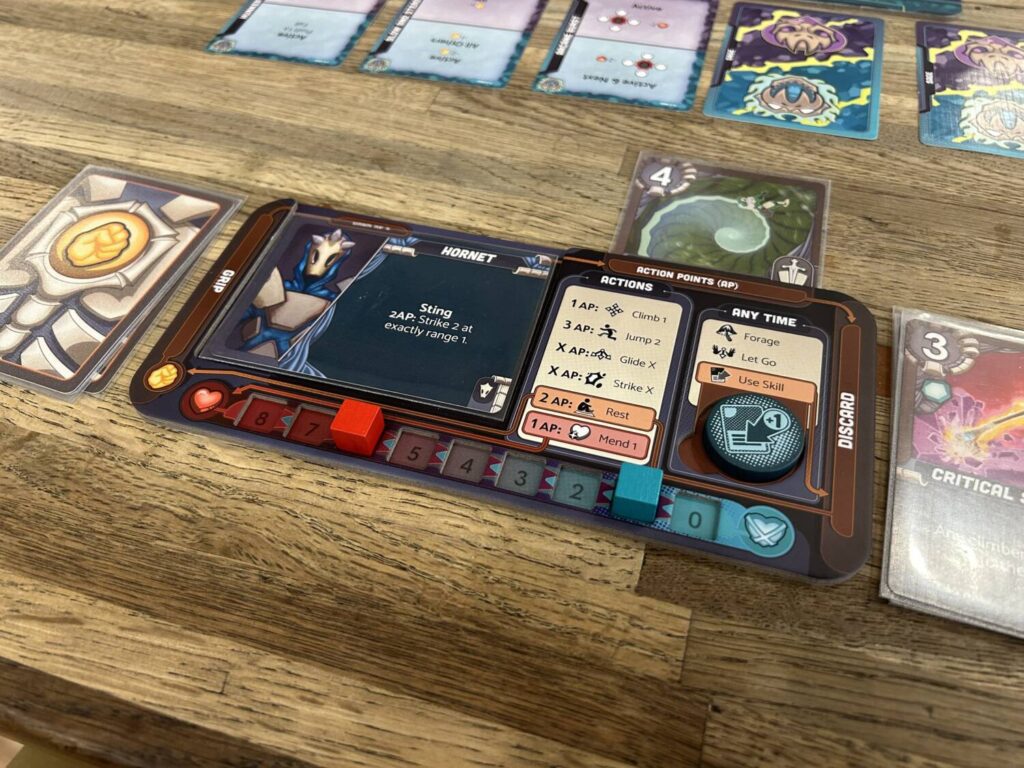
Action!
Over the last decade, I have played dozens of games of Pandemic and its myriad progeny, including Flash Point, Sub Terra, Sub Terra 2, Dead of Winter, and Evil Dead 2: The Board Game. While these games diverge in their themes (and quality), they share a core mechanism: Action Points (AP). Every player has X points to spend on actions on their turn, with each available action costing Y. You can do whatever you want with your points so long as the math works out.
Though Pandemic did not create AP, Matt Leacock’s merry band is certainly responsible for the mechanism’s ubiquity over the past decade and a half. Cooperative designs with AP have become a fixture. It makes sense. Action Points are easy to learn and understand, and they bottleneck what you can do with your turn, making it easier for game designers to formulate the kinds of tense situations that make most cooperative games worth playing.
My admiration for Pandemic aside, I don’t love or even particularly like any of those games. I get bored. I always assumed the issue was some sort of inherent disagreement between Action Points and myself. I love feeling restricted in a board game, but AP makes me feel artificially restricted. Not for me, I long ago concluded. That’s alright, there are plenty of games out there.
Leviathan Wilds gets around that by attaching Action Points to the cards in your hand. It’s always a trade off, deciding whether to use a powerful card for its effect or those sweet, delicious AP. You are making a conscious decision about how much you want to do this turn. There’s rarely a “Well, I guess I’ll also do this” after the two things you wanted to do are done. If you only needed three AP, you probably would have chosen a card that gave you three. As a result of this system, every decision feels like yours. A well-executed turn is an accomplishment. More than that, it’s fun.
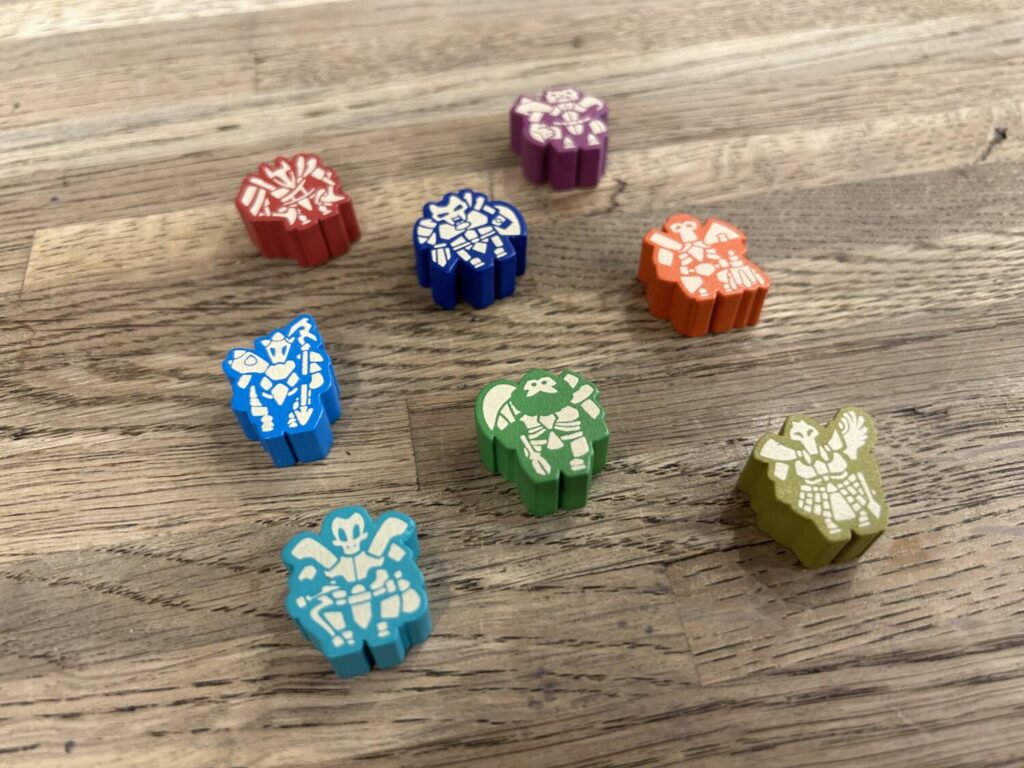
Fun
That’s the main thing about Leviathan Wilds: it is fun. You feel awesome as you move around the board, figuring out how best to manage each of the Leviathan’s attacks, making the most of the cards in your hands and your character abilities. I spent my first session desperately wanting to execute a maneuver between two spaces simply because it would have been cool. That’s rarified air.
You also feel a sense of ownership over your climber, a degree of personal investment and even agency that doesn’t come with all co-op games. There are loads of co-ops in which you get to pick a character with a special ability, but those abilities are often marginal. Consider Pandemic: the Researcher and the Medic are important, but playing as one versus another doesn’t feel all that different.
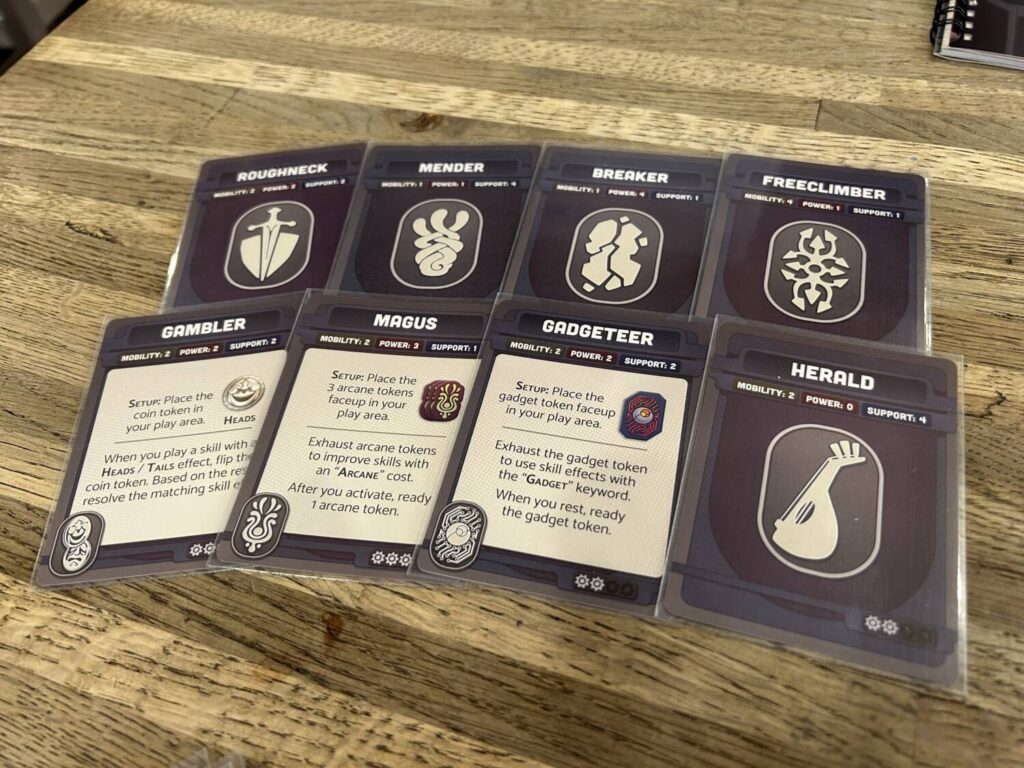
In Leviathan Wilds, you create a deck at the beginning of the game, combining one of eight Characters with one of eight Classes. While they share mechanics, each deck feels admirably different. Some are focused on dealing damage, hopping around, or boosting other players. My favorite is the Gambler, whose cards are subject to a literal coin flip. What an inspired idea. More of that kind of thing, please.
Most impressive to me in this design is the dynamism. You have a small hand of three cards, but many of them can be played on any player’s turn. As a result, you constantly feel invested in what’s happening. There is no down time if your group plays at a brisk tempo, even at four players.
It can be blisteringly hard. There’s no guarantee of success. To win, especially once you get past the three starter Leviathans, is to feel accomplished. It’s a magnificent game, probably best-in-class. I’ll put it to you this way: I brought this game in to work to play with a group of 12-year olds a month and a half ago. Two days ago, one of them came up to me to ask, for the third time in the intervening six weeks, when the store was going to get Leviathan Wilds in stock. When this baby hits, it’s gonna be big.
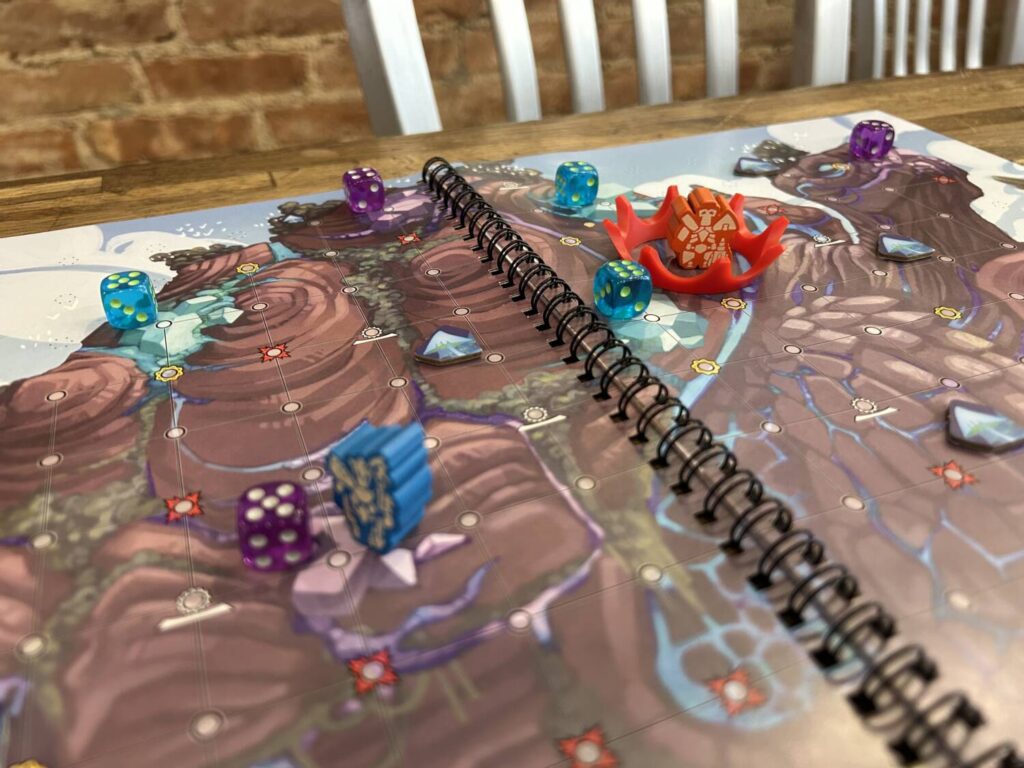


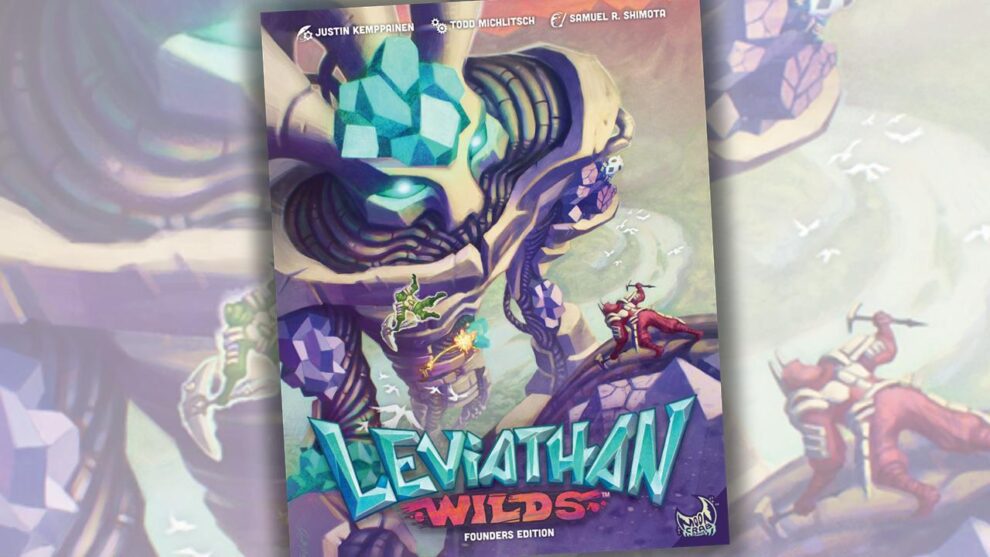








Add Comment